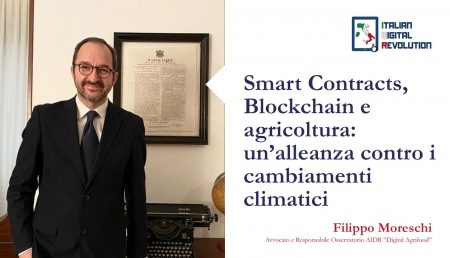(by Filippo Moreschi, lawyer and Head of AIDR “Digital Agrifood” Observatory) One of the most significant characteristics of the so-called “Data driven agriculture” is its double “internal” and “external” profile. Internal, as regards the data concerning the production, safety and traceability of processes and agri-food products. From the original perspective of "Data driven agriculture", in fact, the data collected on a company scale are used to improve the performance of the company, provide a qualitatively and quantitatively better and safe product and reduce the two main threats for the agricultural sector: exposure the risks associated with atmospheric conditions and product waste.
Nevertheless, the company communicates with the outside world, encounters and affects environmental matrices, uses consumable resources and, to a certain extent, pollutes. Hence, again in 2018, FAO, referring to strictly "field" data such as the values and nutrient composition of the soil, the use of fertilizers, seeds and water, spoke of "localized" company data to be shared with other subjects (“shared with others”) outside the company. The quasi-public nature of these values was underlined, which must contribute, together with those of all the other operators, to the defense of the environment and the fight against climate change. These are those data, born in the company, which flow into statistical surveys, government determinations, policies, decisions of producer associations.
Furthermore, for some years now, the World Economic Forum has been exploring the usefulness of blockchain and smart contracts in the fight against climate change. The study "Building Blockchains for a better planet" (2018) declined the usefulness of these technologies in supporting the circular economy, pollution control, disaster prevention, next generation sustainability verification, helping companies to improve their performance environmental. It was believed that an interoperable decentralized system could allow for the sharing of information and quick automated transactions via smart contracts.
The World Economic Forum itself seems to be following up on these forecasts today.
An article published last June 30 by Adelyn Zhou illustrates some experimental applications of smart contracts and blockchain technology in the fight against climate change and in aid to sustainable agriculture.
The technological prerequisite is the concrete operation on the blockchain of the "oracles", ie the so-called "trusted external elements" which, by communicating a certain real data, confirm the occurrence of a certain event and trigger the sequence envisaged by the smart contract. This allows smart contract developers to create applications on crops, soil quality, weather reports and more, using more and more data from the Internet of Things.
The first application concerns the possibility of automatically supporting farmers and all those who are committed to soil regeneration, increasing forestation. Smart contracts, in this case, use satellite data to automatically provide rewards and support to farmers, companies (but also governments) who carry out or promote active soil regeneration.
Payment is made when the "oracles" extract data from satellite images and activate smart contracts. The sequence on the blockchain guarantees transparency and fairness to the system.
But agriculture is also protected through insurance solutions that guarantee protection above all to small owners - largely uncovered on a global scale - in the face of disasters and climate change that increasingly endanger their crops.
Therefore, thanks to smart contracts, farmers can set their field strategy based on data and meteorological models, pre-define the conditions for the execution of the contract (such as a certain amount of rain) and, once the "oracles "Signal the fulfillment of the condition, obtain the refreshment or the payment.
More generally, the development of smart contracts can virtuously affect the lower production of greenhouse gases and environmental education. A farmer, person or company that has invested in reforestation could be paid for with a "tokenized" carbon credit which in turn can be resold to third parties. The carbon credit is created only if the satellites or other devices report the reforestation to a smart contract, so that even the buyer of the carbon credit can verify that a real and effective process that involved the environment and the environment corresponds to this title. 'ecosystem.
We will see, in practice, how far these first applications can spread. Certainly, a general use of these tools, combined with an increasingly widespread culture of environmental data, can really revolutionize the entire agri-food production system, while making an important contribution to sustainability.
